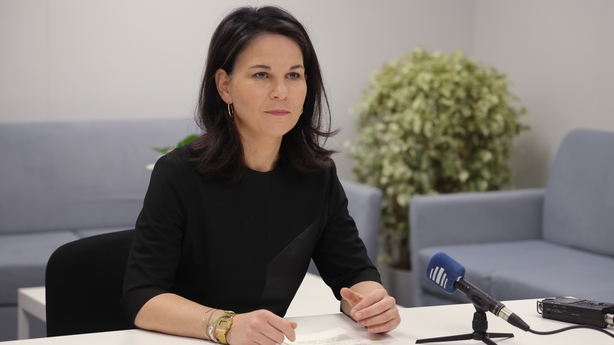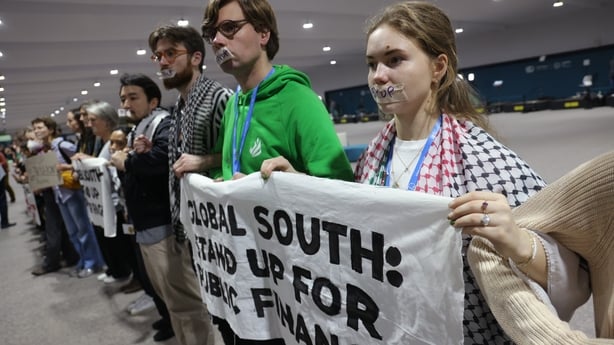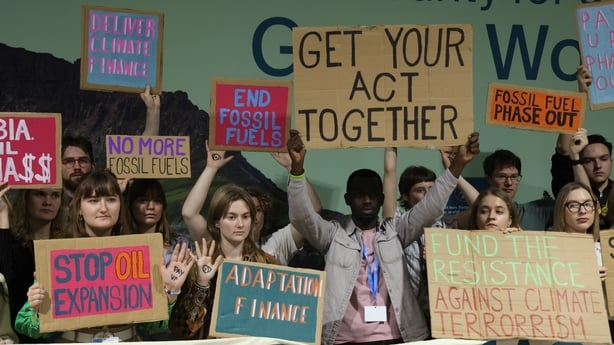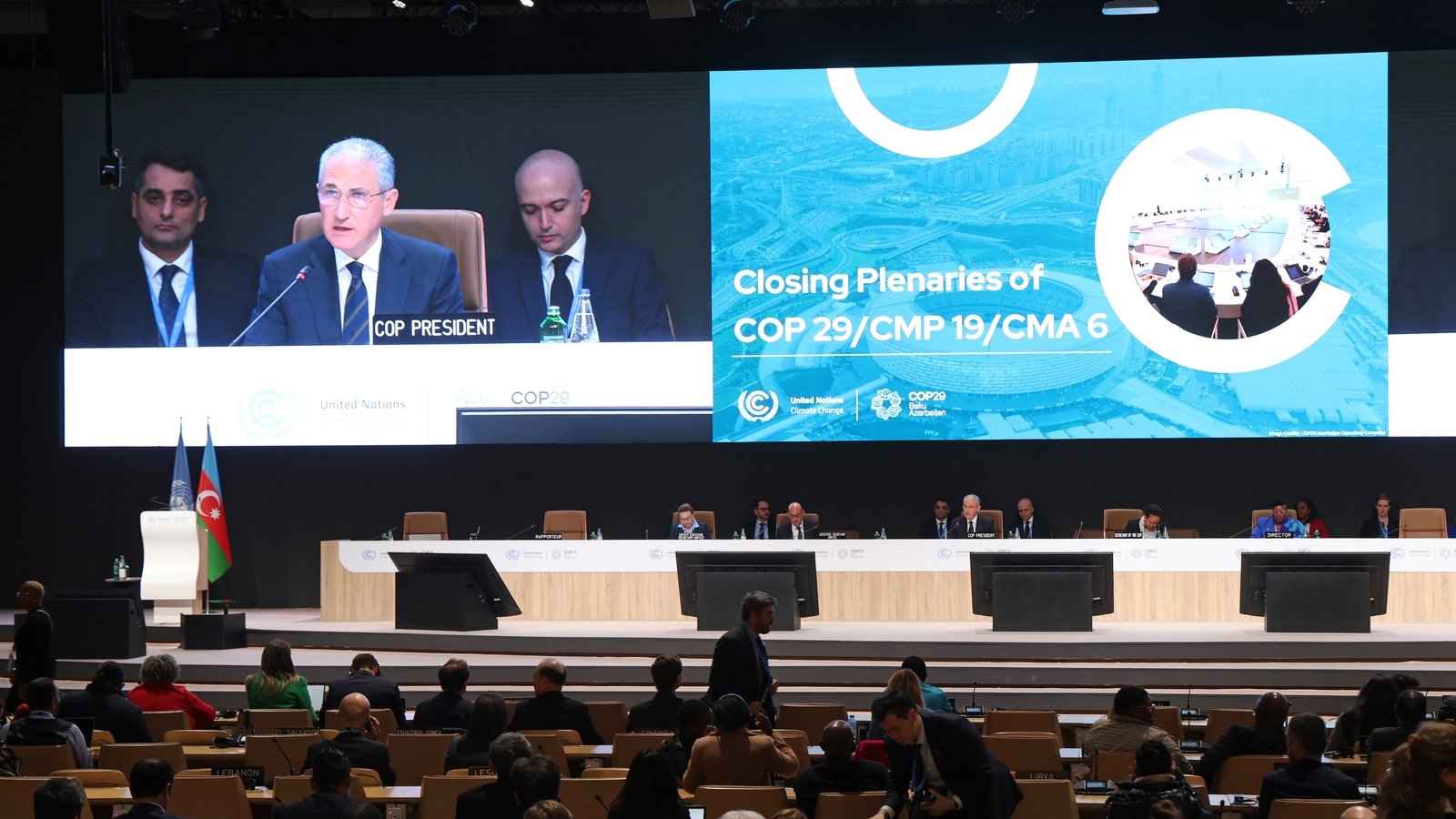The COP29 climate talks in Baku was the 29th time in 32 years that the nations of the world gathered to negotiate what to do about climate change.
But it is the first time ever that money – climate finance – was the main item on the agenda.
The reverberations from the rows that resulted, and the divisions that opened up, will impact climate politics for a long time to come.
Even before the negotiations properly began it was generally accepted that the amount needed would be $1tn per year by 2030, rising to $1.3tn by 2035.
That is what the best economic experts calculate needs to be made available for poorer nations to have any chance of protecting themselves and their vulnerable populations from the worst impacts of climate change.
It would also give them the funds to become low carbon emitters, which would benefit us all.
UN Climate Change Executive Secretary Simon Stiell repeatedly emphasised throughout the talks that climate finance was not charity.
We all share the same atmosphere and there is little point in reducing emissions in the developed world if emissions continue to rise in emerging markets and developing countries where population growth is strongest.
It was a message driven home too, on more than one occasion, by Antonio Guterres, the UN Secretary General, as he urged the parties and negotiators to soften their hard lines.
In principle this need for additional finance made perfect sense to all negotiating parties. Nobody dissented.
The big argument was always about how to ensure such enormous sums of money will be provided.
Who will pay, who will receive, who will be responsible, how much should come from governments, the private sector, the World Bank, and other multilateral development banks.
Should China (which is included on a 1992 list of developing countries) get a free pass, or instead be compelled to contribute?
The mega-rich Arab oil states too – they are listed as developing nations on the 1992 list and refuse to let anybody knock them off that list.
What about new global taxes that could be ringfenced and channelled into climate finance? That means the possibility of new levies on airline flights, or shipping, or better still, on oil or other fossil fuels.
Perhaps the biggest row was over how much of the $1tn would come from public finance sources.
Of course, public finance was the preferred funding route for most poorer countries.
NGOs campaign for global south
Funds that come from governments like our own, tend to be doled out as grants rather than loans. They don’t saddle a developing nation with enormous debts that eventually drag them down.
Many non-government organisations campaigning for the so-called Global South, the cover-all description adopted for developing nations of the world, argued that the entire $1tn per year by 2030 must come from the public finances of western governments.
Anything else they said would be a sellout and not acceptable.
Climate champion, and a member of the Elders, Mary Robinson, told them when she arrived last week that they would have to lower their expectations.
If they could get a commitment for $300m per year of climate finance from government sources by 2030, they would be doing well, she said.
The rest would have to come from other sources, including the private sector.
That didn’t quell the demands from civil society organisations however, or the accusations and recriminations against rich nations.
Laurie van der Burg, at Oil Change International, said a commitment of just €300m of climate finance from government sources would be embarrassing.
She said it would allow rich countries to dodge the climate debt they owe to the Global South by relying on the private sector to provide the remaining funds.
This would then create a debt trap for countries most vulnerable to the climate crisis.
“Rich countries must seriously step up and pay the trillions they owe to the global south. They can raise over $5tn every year for climate action if they end fossil fuel handouts, tax the super-rich, and change unfair global financial rules” she said.
Ms Robinson fingered Saudi Arabia and its Arab group as being the number one blocker to progress an overall agreement.
Russia too, another very major oil producer, was causing blockages behind the scenes for what she described as geopolitical reasons.
Oil states blocking agreement are being protected-German Foreign Minister
Germany’s Foreign Minister, Annalena Baerbock, became very heated about that same issue and let loose on the final day of the talks.
She said openly that the oil states blocking the agreement were being protected and supported by the COP29 Presidency, Azerbaijan, which itself is yet another major oil producer.
Read more: COP29 clinches $300bn for poor nations in climate deal
“We are in the midst of a geopolitical power play by a few fossil fuel states.
“Their playing board is the backs of the poorest and most vulnerable countries.
“We as a European Union will not accept a deal that comes at the expense of those who suffer most from the effects of climate crisis.”

She described what was taking place at the most fraught stage of the negotiations as the last stand by the old fossil fuel world and said the EU will not allow the most vulnerable, especially the small island states, to be ripped off by the few rich fossil fuel emitters.
She said: “Climate finance and CO2 reduction are closely linked. We, as the EU, therefore increased our financing commitments until 2035.
“We are continuing to work on building bridges. We are living up to our responsibilities, including as historical CO2 emitters.”
No deal is better than a bad deal stress activists
It was a message that would have been well received by the civil society groups repeatedly demonstrating outside the massive COP29 plenary halls right up to the very end.
They danced under banners, urging on the negotiators representing the global south.
No deal is better than a bad deal was their central message.
The anger of these civil society groups over the failure of the global north to pay for the climate damage their carbon emissions have inflicted on poorer nations was clear.
They keep on destroying our lands, said Haneen Shaheen an Arab World Member of Climate Action Network.
“We need to be clear about obligations – the obligations for the ecological debt, for environmental collapse, for the surpassing of the planetary boundaries,” she said.
“They are playing with the lives of people, our existence, our present and our future.”
Another demonstrator, this time representing the youth of Africa, spoke about feeling frustrated, and angry, and disappointed.

“We gather year after year in COP summits listening to all their promises and pronouncements. But the reality is betrayal. A betrayal of the planet. Betrayal of vulnerable people. Betrayal of the younger generation. And all the while politicians pat themselves on the back.
“We pour over these texts, these draft decisions for COP. And what do we find? A disheartening echo of unfulfilled promises and pledges from a system rigged against those who need it.
“The needs are astronomical. We need trillions and not billions. Where is this money, and where is the justice?”
Activist Tetet Lauron was even more impassioned.
She described the climate negotiations as a farce that has been going on for the last 30 years.
She said: “Our people have been dying. Our people have been displaced. The climate crisis is upon us and we did not cause it.

“People are being silenced, killed, harassed for defending the rights of the environment.
“This is how rich countries of the global north, together with their corporations, are putting in dirty tactics, dirty tricks all over these negotiations just to confuse everybody, but also to continue peddling that lie that fossil fuels are clean, that corporations can be part of the solutions, that multilateral development banks are providing climate finance
“No, they are not.
“We are drowning in debts, and they’re wasting our time while people are dying under floods. They ruin our world, ruin our future, and they want to ruin everything for every coming generation.
“If they think that we’re going to accept the private sector controlling our future, shaping our adaptation plans, and telling us what to do, if they think that the banks are going to be allowed to control our economy, we are telling them no.”
This was all very strong stuff at the end of a truly exhausting fortnight at the climate talks in Baku.
And it seems clear from the anger articulated by the civil society groups that the fight for climate justice is going to go on and on.

